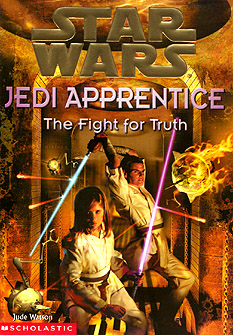Jedi Apprentice #9 - The Fight for Truth
by Jude Watson

Published by Scholastic

Scott's Rating: 3.5 out of 4

This is the ninth book in the Jedi Apprentice series. Obi-Wan and Qui-Gon are dispatched to the planet Kegan with Adi Gallia and her Padawan Siri. The Jedi have received a request to come and check a baby for Force potential. However, what makes this unusual is the fact that the planet has been isolated for many years. They have cut themselves off with all contact from outsiders. Yoda sees this as an important diplomatic opportunity.
When the Jedi arrive, they discover a society very similar to the one created by George Orwell in '1984'. Big Brother is watching them. They will be happy whether they like it or not. They are assigned jobs. Children are taken to mind warping school at an early age. The planet is run by a man and a woman (who may or may not have Force potential) who believe the only way to avoid the planet's destruction by outsiders is to cut off all contact from them. They have had a vision of the future and they see the planet being overrun by men in masks, blown up by a planet destroying weapon, and the Jedi tied to it all. (Sound familiar?)
The only reason the Jedi were called was because the parents of the baby were fearful for their child. They sent out a secret message to the Jedi and were discovered. But rather than turn the Jedi away, they are allowed to land. Once the Jedi discover the true nature of Kegan, they begin to gather data to report back to the Jedi Council. However, things turn complicated when Obi-Wan and Siri are kidnapped and taken to the learning center for child brainwashing. The baby disappears as well. Can matters get any worse?

Scott:
This book was cool because it explored teams of Jedi working together. Padawans must learn to fight side by side while their Masters must learn to cooperate. This was pretty interesting as it will become important in the prequels. We haven't seen much interaction between Jedi outside of the Master/Padawan relationship yet.
The society in this book was rather interesting. It seemed to definitely be modeled after 1984 and "Big Brother is watching". They even have phrases and sayings that are similar. That was an interesting aspect to explore in this book.
I've got to add that the cover to this one was very well done. Very eye catching. Nielsen has done another incredible piece of work. And is that Sarah Michelle Gellar (Buffy) standing in for Siri? :)
Finally, this could be a spoiler, so don't read if you want to avoid it.
The book ends with Qui-Gon looking over at Obi-Wan and suddenly being struck with a vision of the future. He sees Obi-Wan as an old man standing in the desert haunted by the past. It was a rather powerful moment and it was one of the first times I was able to connect these Jedi Apprentice stories to the classic trilogy. I was able to actually see the gap bridged between Episode I and A New Hope ever so briefly. The visions about the Death Star and the stormtroopers was also rather foreboding.

Scott:
One thing I have yet to see be explored is the fact that the Jedi are pretty much baby snatchers. They take kids away at a young age and suddenly become parents to these children. Is this hard for the kids? How could a parent possibly give up their child to be raised by strangers? None of this has been explored yet, though there was a good opportunity to get deeply into it here.
The rulers of Kegan also have very accurate visions about the future. It is actually barely explored beyond the surface. Do they have Force potential? Does anyone consider their vision may be accurate? How do the Jedi handle Force users ruling planets? There was a lot to explore here, too, and it was only glossed over.
Obi-Wan and Siri also seemed to get away with a lot easily when they were in captivity. They smarted off to the teachers. (Hey, teachers! Leave them kids alone!) They kept getting into trouble. All they got was bad points on their record. If a society was capable of locking kids up and brainwashing them, you'd think they'd do something more harsh than making kids clean a kitchen.
Finally, the ending was a little too tidy. The Jedi came and disrupted an entire society by helping to destabilize their government, abolish their education system, and totally turn their culture and ways of doing things upside down. The impact of that is only discussed in the last few pages. I realize this is a kids book and it needs to be wrapped up quickly, but it was a little unsatisfying ending to an otherwise great addition to the series.

Scott:
The food served at the Learning Center - vegetable disks! Sounds like what used to be served in our school cafeteria!

